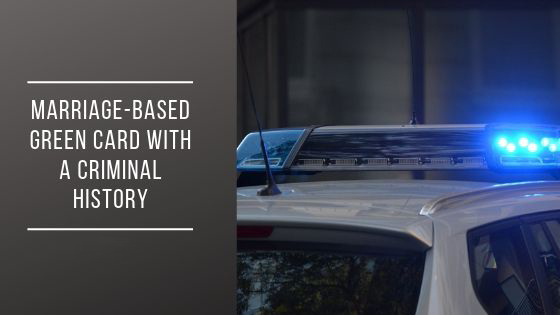Ordinarily, the U.S. marriage-based green card application is a highly scrutinized visa procedure due to how common fraud cases are. This process can get more complicated if an applicant has been involved in certain crimes in the past, especially if they were convicted. You are required by immigration law to declare your criminal history when filing your marriage-based green card petition, no matter whether the case was minor or severe. VisaNation will ensure that your application includes all of the documents that must be present to support your application, even if you have a criminal history.
Increase Your Green Card Approval Chances with VisaNation.
Fortunately, while your past crime may make your approval chances slimmer, it doesn’t automatically mean denial. Obtaining a green card with a criminal history means meeting certain requirements. This article gives you a complete guide on the types of crimes that may impact your marriage-based green card application process and how to file your petition if you are affected.
Crimes That Make Marriage-Based Green Card Applicants Inadmissible
The criminal history section of the marriage-based green card application form can be complicated for many applicants. This is because you may need to state every past interaction you’ve ever had with law enforcement both inside and outside your home country.
Regardless of how minor the case is, you should ensure that it is stated in the petition, as lying or intentionally obscuring information will make your situation more complicated. Bear in mind, however, that not all kinds of crimes lead to immediate marriage-based green card denial. The Law separates the types of crimes that may cause denial into three categories. They are:
Crimes Involving Moral Turpitude
A crime involving moral turpitude in the context of the U.S. immigration law means a crime committed with malicious intent. This includes physically harming or defrauding another person. Some of these crimes include stealing, murder, fraud, as well as domestic or severe violence. Malicious intent refers to whether you actually committed the offense, just made an attempt, or conspired with others in planning or carrying it out.
“Moral turpitude” is not clearly defined by Congress, so there have been varying conclusions drawn by different courts when deciding what constitutes moral turpitude. Past court decisions may also come into play when determining if your crime fits into this category. It must be noted, however, that some forms of assault or battery and some parking or moving violations don’t count for moral turpitude.
Get a Green Card for Your Spouse
Aggravated Felony
Just like moral turpitude, what constitutes an aggravated felony in your green card application processing is quite different from the general definition under federal laws. Rather, it is usually decided based on the list of crimes provided by Congress which make a green card applicant inadmissible. Aggravated felonies as listed by the federal Immigration and Nationality Act include, but are not limited to:
- Murder rape, sexual abuse of a minor
- The illicit trafficking of firearms or destructive devices
- Theft or Violence with imprisonment of up to one year
- Laundering of money over $10,000
- Child pornography offense
- Gambling, racketeering of up to a year imprisonment
- Human trafficking, transporting and managing for prostitution
- Bribery
- Persecution, torture, genocide
- Severe violation of religious freedom
VisaNation will take care of your immigration application so that you can focus on your relationship and family.
Reunite with Your Spouse Sooner
Drug-Related Crime
You may also be inadmissible to the U.S. if you have been involved in any drug-related crime. This includes being in possession of or engaged in the illicit trafficking of certain drugs such as cocaine, heroin, or marijuana.
If you were convicted of being in possession of fewer than 30 grams of a controlled substance, you may still marriage-based green card granted. However, this will require you to apply for a waiver.
Will Immigration Officers Find Out If I Don’t Declare Past Crimes In My Application?
When filing an application, green card applicants are always required to state whether they have been convicted or arrested in the past, as this is one of the bases by which immigration officers will determine your admissibility. Just as with all aspects of the immigration process, it is advisable to be honest. VisaNation ensures that there are no significant gaps in your application and that you have provided the required documents and forms. Start your application today!
Failure to be honest about your criminal history will constitute giving false testimony or misrepresentation. In many cases, those who refuse to declare their past criminal history are caught through other means. As part of your application process, you will undergo biometric screening (involving fingerprint checks), which will reveal your past records, including any crimes you have committed in the past. If you are caught through this way, there will be severe punishment which could include denial of marriage-based green card, barring from future immigration attempts, or even deportation if you are already in the U.S.
Increase Your Green Card Approval Chances with VisaNation.
How Do I State My Past Crime When Filing A Petition?
Whether you are applying through consular processing in your home country or adjusting your status in the U.S., there is a section of your application form meant for inadmissibility on past criminal activities. This includes arrests and convictions. You will be asked a series of questions. When you come across a crime you have committed in the past, you are expected to answer “yes” with additional information.
The additional information should include an explanation of what actually occurred as well as the date and location where the event took place. If there is documented evidence of the event such as police statements or court decisions, you will need to provide them as part of the evidence for your application.
Does a Criminal History Automatically Cause Denial of Marriage-Based Green Card Application?
Your past criminal records may not necessarily mean your marriage-based green card will be denied. In some cases, all you need to do is meet the criteria for a waiver request and present your petition in a convincing way. Some crimes such as murder, drug trafficking, and other felonies generally make people unqualified for the waiver request.
Depending on the type or severity of the crime, you may be allowed to file a waiver on two bases. The first is that you may request for a waiver if you can prove that granting you a marriage-based green card would not have any negative effect on the U.S. national welfare. The second basis for applying for a waiver is to prove that denying you a green card will cause severe hardship to your U.S. citizen or permanent resident spouse. Some of the crimes that you are allowed to file a waiver for include:
- Being convicted for prostitution or crime related to prostitution
- Past crime involving moral turpitude
- If you were convicted for being in possession of fewer than 30 grams of marijuana
Does It Matter When the Crime Was Committed?
Time of the crime is another factor when weighing your chances of getting a marriage-based green card. If you were recently convicted, the likelihood of facing denial is higher than if the crime happened in the distant past. One of the criteria for getting a green card is for an applicant to demonstrate good moral behavior for the 3-5 years leading up to their application.
Also, for a minor felony conviction, you may still be considered for a green card if the incident happened 10 or more years prior to your application. This will depend on how well you can prove your case to the immigration officers. However, in the case of an aggravated felony, you will likely be permanently barred from receiving a green card.
How to File a Criminal Record Waiver
The time to file a waiver will depend on your location. If you are applying from your home country, you will need to wait until after the consular interview. At your interview, the immigration officer will inform you whether or not your criminal history will affect your admissibility into the U.S., and will tell you if you are eligible for a waiver. You will need to file based on the waiver procedures of the embassy or consulate, as the process varies from one embassy to another.
If you are applying for a marriage-based green card while in the United States, you may file a waiver alongside your I-485. While you may also submit it while your application is pending or after your green card interview, it is usually better to file a waiver with your I-485 to avoid delays. You will need to file an I-601 form to request for a waiver. You must submit the I-601 with supporting evidence, such as proof that establishes you may qualify for a waiver or evidence that not granting you a marriage-based green card will cause extreme hardship your spouse.
The filing fee for the I-601 form is $930, which can be paid using a money order, personal check, or cashier’s check. You may also submit a G-1145 E-Notification with the waiver to be able to keep track of the process.
How VisaNation Law Group Immigration Attorneys Can Help
It is up to the discretion of the immigration officers to determine if your criminal history is worth making you inadmissible or not. Even a misdemeanor may lead to your marriage-based green card being denied if your petition lacks clarity. If you have a record of arrests or convictions, your immigration application will require more attention than usual. The best thing is to let an immigration attorney help you gather evidence and file your petition.
VisaNation Law Group consists of a team of marriage-based green card immigration attorneys who are highly experienced in how the criminal history section of the application works. We will examine your case and determine the best way to approach it. Whether you are about to file your petition or have already faced a denial on criminal history grounds, we can help. Get started today!
 Shilpa Malik
Shilpa Malik  Sabrina Saada
Sabrina Saada 